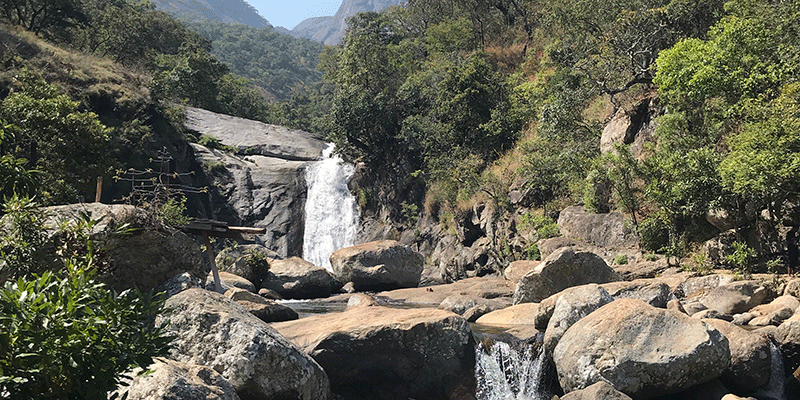Nsima, tea plants, and the chilema tree

July 20-23
After five weeks of hard work in the field and office, we got to explore other areas of Malawi. To begin our vacation, we drove south to Mulanje. On our way there, we stopped at the house of a UIUC professor, who had retired in Malawi, his homeland. We enjoyed a traditional, homecooked meal and even got a lesson on making nsima. Nsima is a staple food in Malawi made out of maize flour. Fun fact: Malawians say that they haven’t eaten a proper meal unless they have eaten nsima.
We then carried on to Mulanje, which is known for its beautiful views. It definitely did not disappoint! Driving through the town, there were vast fields of tea plants on either side of the road. They were so interesting to look at because their tops were cut clean like a hedge and they were a vibrant green color. We also did a short hike in the Mulanje District Park to a waterfall that had mountains in the background. While we did have the option to swim, we opted out because the water was freezing!
The next day we drove up to Zomba. In Zomba we saw a natural phenomenon, the Chilema tree! This tree has several roots coming out of different trunks, making it look like many trees instead of one. It is impossible to see where the original tree actually starts. It was very cool to see!
This summer, the Office of International Programs is sponsoring three undergraduate Food Security Fellows who are participating in experiential learning experiences related to global food security. These ACES students are based in Malawi and will be blogging regularly during their experience.
Specifically, the students will be working with the ACES-based and USAID-funded Strengthening Agriculture and Nutrition Extension activity to deliver a video-extension campaign to smallholder farmers. Working with counterparts from Malawi, our students will provide technical support for the video work and collect data to evaluate the success of the campaign. They will gain on-ground appreciation for how rural development actually works and how a development project functions.
The ACES undergraduate Food Security Fellows are:
- Christina Fernandez, senior in natural resources and environmental sciences
- Kristin Iverson, senior in agricultural leadership and education
- Anoosha Memon, senior in agricultural and consumer economics